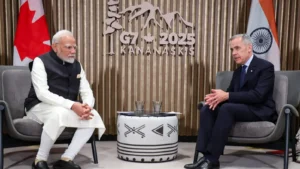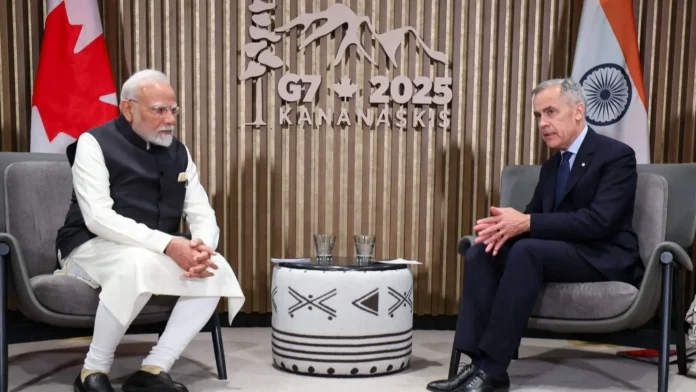
Qalam Times News Network
In a significant diplomatic development, Indian Prime Minister Narendra Modi met with his Canadian counterpart Mark Carney on the sidelines of the G7 Summit, marking a potential turning point in strained bilateral relations. The meeting, held at the scenic Kananaskis resort in Canada’s Rocky Mountains, comes after nearly two years of deep diplomatic freeze between the two nations.
The interaction is being hailed as a major step towards reconciliation after tensions escalated in 2023 when then-Canadian Prime Minister Justin Trudeau suggested a possible link between Indian agents and the killing of Khalistan supporter Hardeep Singh Nijjar. The statement had triggered a major diplomatic row, with both nations expelling senior diplomats and suspending several bilateral engagements.
Prime Minister Modi described his meeting with Carney as “excellent” and emphasized the strategic importance of India-Canada ties. In a social media post, he wrote, “Prime Minister Carney and I are committed to working together to further deepen the friendship between India and Canada.” Modi also congratulated the Canadian government for successfully hosting the G7 Summit.
Carney, who assumed office in March 2025, termed the meeting a “great honour” and noted that India’s participation in the summit reflects its growing global influence. He acknowledged the need for both countries to jointly address global challenges such as extremism and terrorism. His decision to invite Modi to the G7 Summit, despite pressure from pro-Khalistan groups, is being seen as a clear signal of Canada’s policy shift towards constructive engagement with India.
During the meeting, both leaders agreed to restore full diplomatic ties, including the appointment of new High Commissioners. This move is expected to pave the way for the resumption of regular consular services, including visa issuance, which had been affected during the diplomatic standoff.
The discussions also touched upon expanding cooperation in key areas such as trade, clean energy, artificial intelligence, and the promotion of democratic values. Notably, bilateral trade between India and Canada reached $9 billion in 2023. With over 1.8 million people of Indian origin residing in Canada—of which approximately 760,000 are Sikhs—the two countries share deep-rooted cultural and economic linkages.
Carney had earlier signaled a willingness to recalibrate Canada’s approach to India, and his administration’s outreach marks a departure from the hardline posture of the previous government. Experts believe that the Modi-Carney meeting could usher in a new chapter in Indo-Canadian relations, built on mutual trust and shared global priorities.
Beyond Canada, Prime Minister Modi utilized the G7 platform to engage with global leaders from South Korea, Mexico, France, the United Kingdom, and Australia. He reiterated India’s commitment to global peace and development while advocating for the concerns of the Global South.
As diplomatic observers note, the Modi-Carney engagement is not merely symbolic. It holds the promise of renewed strategic cooperation, increased economic engagement, and the rebuilding of mutual confidence—elements critical for stable and forward-looking bilateral ties.







